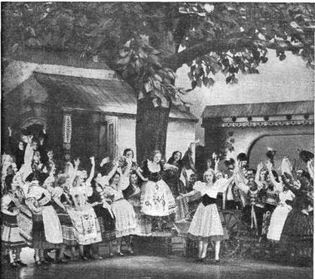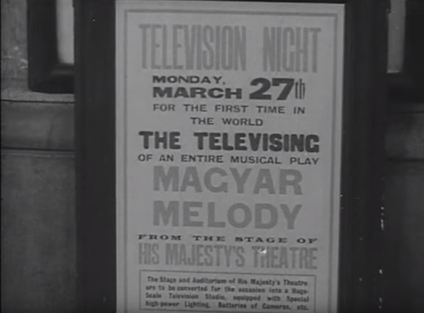Show History
Magyar Melody, a romance set in Hungary, premiered in Manchester at the Opera House in 1938. The production transferred to His Majesty’s Theatre in London, opening on January 20, 1939 and playing for 105 performances.
The score contained the songs 'The Lanccers', 'Were Ev’ry Pretty Girl a Song', 'Czarsas', 'Just Like a Gypsy Band', 'Magyar Melody', 'Home is the Harvest', 'My Heart Belongs to Budapest', 'Operetta Scene', 'Ballet (Moonlight on the Danube)', 'Music for Romance', 'Mine Alone', 'We Don’t Want to Flirt', 'A Tandem in the Park', and 'Duel at Dawn'.
Magyar Melody, a romance set in Hungary, premiered in Manchester at the Opera House in 1938. The production transferred to His Majesty’s Theatre in London, opening on January 20, 1939 and playing for 105 performances.
The score contained the songs 'The Lanccers', 'Were Ev’ry Pretty Girl a Song', 'Czarsas', 'Just Like a Gypsy Band', 'Magyar Melody', 'Home is the Harvest', 'My Heart Belongs to Budapest', 'Operetta Scene', 'Ballet (Moonlight on the Danube)', 'Music for Romance', 'Mine Alone', 'We Don’t Want to Flirt', 'A Tandem in the Park', and 'Duel at Dawn'.
First Musical "Outside Broadcast"
Prior to the war, the BBC was committed to bringing theatre to the masses via television. Most often, plays were re-created within a television studio at the BBC headquarters at Alexandra Palace, however some shows were filmed live at the theatre. These live broadcasts were called “outside broadcasts”.
The broadcast of Magyar Melody was predicted to be the “high-spot” of the outside broadcasts, and was scheduled to run for nearly three hours.
Despite advertisements claiming “the entire musical play” would be televised, it is not entirely clear if in fact the whole show was broadcast. Radio Times on March 6 stated that an excerpt (Act 2, Scene 4), would be broadcast. On March 27, the same publication stated Magyar Melody would be “Televised direct from His Majesty’s Theatre.” Later, on 1 May 1939, the Radio Times claimed that Me and My Girl would be “the first time that a musical comedy has been televised in its entirety from a theatre (Maygar Melody did not quite fall into this category)”.
However much of the musical was broadcast, The Observer reported on April 2 that the BBC “has been snowed under with congratulations on the televising of Magyar Melody direct from His Majesty’s Theatre…” The reporter was so inspired by the broadcast, they wanted to see the show live -
Prior to the war, the BBC was committed to bringing theatre to the masses via television. Most often, plays were re-created within a television studio at the BBC headquarters at Alexandra Palace, however some shows were filmed live at the theatre. These live broadcasts were called “outside broadcasts”.
The broadcast of Magyar Melody was predicted to be the “high-spot” of the outside broadcasts, and was scheduled to run for nearly three hours.
Despite advertisements claiming “the entire musical play” would be televised, it is not entirely clear if in fact the whole show was broadcast. Radio Times on March 6 stated that an excerpt (Act 2, Scene 4), would be broadcast. On March 27, the same publication stated Magyar Melody would be “Televised direct from His Majesty’s Theatre.” Later, on 1 May 1939, the Radio Times claimed that Me and My Girl would be “the first time that a musical comedy has been televised in its entirety from a theatre (Maygar Melody did not quite fall into this category)”.
However much of the musical was broadcast, The Observer reported on April 2 that the BBC “has been snowed under with congratulations on the televising of Magyar Melody direct from His Majesty’s Theatre…” The reporter was so inspired by the broadcast, they wanted to see the show live -
"Is there one of us who saw the show by our firesides who has not determined to go to His Majesty’s at the earliest possible moment and have the colour added to the delights of fine acting, dancing, grouping and scenery?”
Unfortunately the broadcast of Magyar Melody has not been preserved, although footage can be found on the 1946 BBC program Television is Here Again. As John Wyver states, “The status of these shots is something of a mystery. They cannot be from the live outside broadcast, since there was no form of telerecording at that date.”
Magyar Melody Production Credits
Theatre: His Majesty’s Theatre, London
Producer: William Mollison
Book: Guy Bolton (Anything Goes), Eric Maschwitz, Fred Thompson
Music: Bernard Grun, George Posford, Eric Maschwitz, Harold Purcell
Director: Philip Dorté
Musical Director: Walford Hyden
Dances and Ensembles Arranged by: Joan Davis, Cleo Nordi
Choreography: Betty Bucknell, Pierre
Cast: Anne Allan (Susan Townsend), Lawrence Anderson (Duke of Firth), Stella Arbenina (The Empress Elizabeth), Sara Fischer, Jimmy Godden (Bardos), Binnie Hale (Roszi Belvary), Maggie Jarvis (Peasant Girl), Arthur Margetson (Count Ferenc), Jimmy Miller (Istvan), Leo Morest (The Bosniak) Peter Mosley (Captain Szermay), Isobel Ohmead (Flora, Lady Herriot), Jeanne Planas, Red Rowna, Barbara Spicer (Mrs Townsend), Roger Treville (Michael Herriot), Jerry Verno (Jarvis), Betty Warren (Julika), Ivor Watt (Robins), Alan Bourne Webb (Major Lonay), Josephine Yorke
Theatre: His Majesty’s Theatre, London
Producer: William Mollison
Book: Guy Bolton (Anything Goes), Eric Maschwitz, Fred Thompson
Music: Bernard Grun, George Posford, Eric Maschwitz, Harold Purcell
Director: Philip Dorté
Musical Director: Walford Hyden
Dances and Ensembles Arranged by: Joan Davis, Cleo Nordi
Choreography: Betty Bucknell, Pierre
Cast: Anne Allan (Susan Townsend), Lawrence Anderson (Duke of Firth), Stella Arbenina (The Empress Elizabeth), Sara Fischer, Jimmy Godden (Bardos), Binnie Hale (Roszi Belvary), Maggie Jarvis (Peasant Girl), Arthur Margetson (Count Ferenc), Jimmy Miller (Istvan), Leo Morest (The Bosniak) Peter Mosley (Captain Szermay), Isobel Ohmead (Flora, Lady Herriot), Jeanne Planas, Red Rowna, Barbara Spicer (Mrs Townsend), Roger Treville (Michael Herriot), Jerry Verno (Jarvis), Betty Warren (Julika), Ivor Watt (Robins), Alan Bourne Webb (Major Lonay), Josephine Yorke
Sources
Books
Articles
Websites
- Kurt Gänzl, British Musical Theatre: Vol 2, Oxford University Press, (1986)
- Adrian Wright, A Tanner’s Worth of Tune: Rediscovering the Post-War British Musical, The Boydell Press (2010)
Articles
- E. H. R., ‘Television’, The Observer, 2 April 1939, p. 27
- Uncredited, “Lighting Tricks Off-Stage,” Radio Times, March 17, 1939 p. 17
- John Wyver, “Television (drama) is here again,” Screen Plays: Theatre Plays on British Television, (Sept 14, 2011)
- John Wyver, “From the Theatre, 1938-39” Screen Plays: Theatre Plays on British Television (Sept 27, 2011)
Websites
- BBC Genome: Radio Times 1923 – 2009, "Magyar Melody," Accessed via: http://genome.ch.bbc.co.uk/7ae1d689518b44b0a7f131ffcb141cf6
- BBC Genome: Radio Times 1923 - 2009, "Tunes of the Town: An excerpt from 'Magyar Melody," Accessed via: http://genome.ch.bbc.co.uk/dc652f4637ac4917a55f9459155a7498
- BBC Genome: Radio Times 1923 - 2009, "Me and My Girl", Accessed via: http://genome.ch.bbc.co.uk/f5434a7f227044e19fb4955a1f71a335
- The Guide to Musical Theatre, "Magyar Melody," Accessed via: http://guidetomusicaltheatre.com/shows_m/magyar_melody.htm
- Screen Plays, "Magyar Melody", Accessed via http://bufvc.ac.uk/screenplays/index.php/prog/1369
- Television is Here Again, BBC (1946), Accessed via YouTube.
Written by Luisa Lyons (December, 2016)


